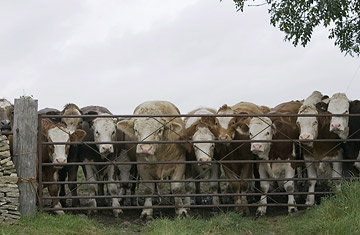
E.U. farm commissioner Mariann Fischer Boel downplayed the changes to Europe's Common Agriculture Policy (CAP) she unveiled Tuesday as a mere "health check". Her proposals, she said, are "all about freeing our farmers to meet growing demand and respond quickly to what the market is telling them."
But even before she had spoken, Europe's formidable farming lobby had mustered its defenses to fight off what is seen as reckless surgery on the E.U. subsidies, import tariffs and quotas.
France, the E.U.'s biggest recipient of farm aid, launched a preemptive strike, warning that the global food crisis made the CAP more relevant than ever. "The solution to the crisis is not, first of all, through free trade," French Agriculture Minister Michel Barnier told fellow E.U. farm ministers on Monday. Paris also co-opted Germany, the E.U.'s biggest budget contributor, in its bid to maintain the annual flow of around $63 billion (€40 billion) in hand-outs to Europe's farmers.
Any Franco-German alliance is almost impossible for the rest of the E.U. to overcome, particularly since France will take over the reins of the E.U.'s six-month presidency from July 1 this year. Barnier, a former E.U. commissioner, says that European agriculture has undergone enough reform over the past two decades: until 1992, agriculture expenditure represented nearly 61% of the E.U.'s budget, but by 2013 this will have almost halved to 32%. Barnier also argues for a "community preference" which would favor imports that meet E.U. environmental, hygiene or animal-welfare rules — although such a scheme would likely meet with retaliation from World Trade Organization members.
Reform efforts are further complicated by the upcoming referendum in Ireland over the E.U.'s Lisbon Treaty: the 'no' campaign has generated remarkable traction by arguing that Ireland risks losing its generous farm subsidies if voters accept the treaty.
But Fischer Boel, a dogged Dane who owns three farms of her own, is undaunted by the odds. She says reform is vital if the E.U. is to keep up with changing global markets. "It aims to simplify, streamline and modernize the CAP and give our farmers the tools to handle the new challenges they face, such as climate change," she said.
The plans aim to scrap milk quotas and give farmers incentives to look after the countryside rather than producing food. They will further break the link between direct payments and production, allowing farmers to better follow market signals. A progressive reduction in farm subsidies will be accompanied by shifting the money saved to protect and promote traditional family farms. And the plans call for an end to the so-called set-aside rules that requiring some land to be kept out of production.
Fischer Boel has also argued firmly that Europe should not be panicked by the recent rise in global food prices. Even though adverse weather in many regions over several seasons had hurt supplies, the situation now seemed to be returning to normal and was set to take some pressure off prices, she said. "We do not think that the record levels reached in recent months are likely to persist," she said. "There is nothing in the current situation that shows we should make a U-turn."
Fischer Boel can count on the United Kingdom to back the reforms, even if London would have liked to go further by scrapping direct payments to farmers altogether, and end price-fixing mechanisms. However, with France and Germany lining up a trenchant defense of the CAP supports, Fischer Boel's hopes for a modest health check are already provoking a furious reaction from the stubborn patient.
